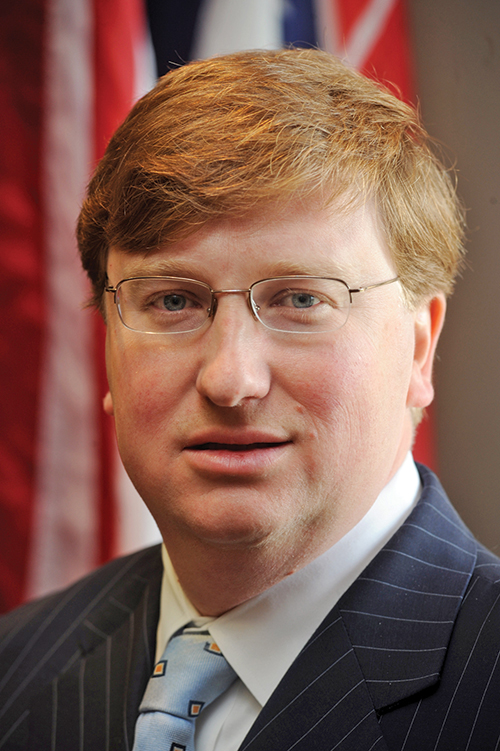When Tate Reeves won the election on Nov. 5 to be the 65th governor of Mississippi, he considered his victory an extension of the mission that he’s been on for many years in state government: fighting for taxpayers and teachers and striving to elevate the skills of Mississippi workers.
Taking office on Jan. 14, Reeves has his sights set on delivering on his campaign promises in each of those areas. In the following interview, he addresses his plans for improving the economy of Mississippi by investing in its people.
As a lifelong Mississippian, you’ve seen your state change a lot over the last 45 years. What have been the biggest improvements in the state’s overall business climate?
GOV. REEVES: Mississippi is always looking for ways to make our state a more attractive place to do business. The first major step in that was tort reform back in the early 2000s. We took a second big step in 2016 when the Legislature passed my Taxpayer Pay Raise Act, the largest tax cut plan in state history. In that, we eliminated one of three tax brackets on state individual and corporate income taxes, and we eliminated the franchise tax, which a lot of our neighbors didn’t have. Mississippi will be more competitive when recruiting jobs, and our small businesses will be better positioned to compete for jobs across state lines. That plan is being phased in over a number of years, and I am proud of the difference it will make in our economy. I want companies to know that Mississippi is open for business and ready to be a partner in growing your operations.

“People think Mississippi is a place for growing crops and manufacturing — and we do those things well. But we also are home to individuals who can think up unique ideas and make them happen.”
What work still needs to be done to elevate the stature and reputation of Mississippi’s business environment?
GOV. REEVES: I believe government doesn’t create jobs; its role is to create an environment for the private sector to create jobs and invest capital. I will continue to look at ways to improve our tax structure to encourage job creation and attract investment. We also have to ensure our workforce training programs are preparing people for the jobs of the next 50 years, not the jobs of the last 50 years.
You’ve been a strong supporter of a balanced budget and minimizing state debt. How do those two things impact Mississippi’s standing as a preferred destination for business?
GOV. REEVES: CEOs want a stable financial foundation for their facilities to thrive. If you have a state where legislators are robbing Peter to pay Paul, they may be coming for your pockets next. Both as state treasurer and as lieutenant governor, my priority has been creating that stable fiscal environment so the private sector can create jobs and invest capital. That is a core function of government, in my view. With our financial house in order, we can focus on the key ingredient in economic development — workforce training.
You’ve also been outspoken in your desire to reform public education in Mississippi. What reforms will you tackle first as Governor?
GOV. REEVES: To compete for the jobs of tomorrow, we must raise our level of student achievement. I am proud that the reforms I championed as lieutenant governor are showing results. Our teachers and students deserve all the credit for their success. Our graduation rate is the highest it’s ever been at 84%, beating the national average. We have a nationally recognized prekindergarten program that brings together the private and public sectors to address community needs. Today, Mississippi leads the nation in student achievement gains on fourth grade reading and math, according to the National Assessment of Educational Progress. We are No. 3 in the nation for gains in eighth grade math, and we rank fourth for gains in eighth grade reading. We have our education system pointed in the right direction, and my goal is to build on that success.
We will also continue to find ways to raise teacher pay, particularly in targeted shortage areas, both geographically and by subject area. We need to help our universities encourage their graduates to stay and teach in Mississippi and their professors to help teach in critical subject areas.
In 2016, you proposed and led the effort to pass the largest tax cut in state history. How did that impact the Mississippi economy, and where do you stand on tax rates today in your state?
GOV. REEVES: My goal is to make Mississippi’s tax code flatter and fairer for all taxpayers. The tax cut I pushed for was a good start to make our state even more attractive for investment and job creation. I plan to keep looking for ways to let taxpayers keep more money in their pockets because I believe they know best how to spend and invest their money rather than bureaucrats in the capital.
You’ve proposed a “Ready to Work” plan that would allocate $100 million to train and equip a modern Mississippi workforce. How would that plan work?
GOV. REEVES: Work is changing. The jobs that paid well 50 years ago are not as strong today, and skilled trades are soaring. We need the next generation of Mississippi workers to be equipped to take on any job. With the right training, they can. My plan will make Mississippi a “Ready to Work” state and attract investment. I plan to invest more in helping local communities be certified as “work ready,” incentivizing high school graduates to earn industry credentials so they are prepared on the first day of their new career, and I will continue to help our community colleges modernize their workforce training capabilities. We also have to combine that with efforts to help working families get on their feet by addressing issues of childcare and transportation.
“I want companies to know that Mississippi is open for business and ready to be a partner in growing your operations.”
But my plan is more than investment. I want to see more young students exposed to computer science and coding before they graduate, to standardize our dual credit programs to help those high school students earn college credit, and let kids earn credit toward high school graduation when they take technical courses that prepare them for a job.
What is your state’s best-kept secret?
GOV. REEVES: The level of creativity and innovation Mississippians bring to the table is overlooked. People think Mississippi is a place for growing crops and manufacturing — and we do those things well. But we also are home to individuals who can think up unique ideas and make them happen. A boy from the Mississippi Delta had the crazy idea he could deliver packages all over the world — in one night. Fred Smith has built FedEx into a global brand. We’re testing rocket engines at the Stennis Space Center and creating high-tech companies from that research. You give us the chance to make a positive impact on your business, and we’re going to be successful, which means you will be successful.
What is Mississippi’s global brand identity? What would you like it to be?
GOV. REEVES: I think people know Mississippians are hard workers, and we’re makers. We make furniture, we make vehicles, and we make battleships. I’m proud of my state’s contributions to manufacturing. That sector is vital to our economic success, and I will keep fighting for these jobs that pay our people well. It is my hope that when my time as governor is over, Mississippi is also known as a place for high-tech, high-skilled jobs. I want to chase those jobs that pay a little more, require a little more knowledge about computers and coding and bring a high level of capital investment. I want Mississippians to walk across the high school or university stage and know that the job of their dreams is right here at home.

